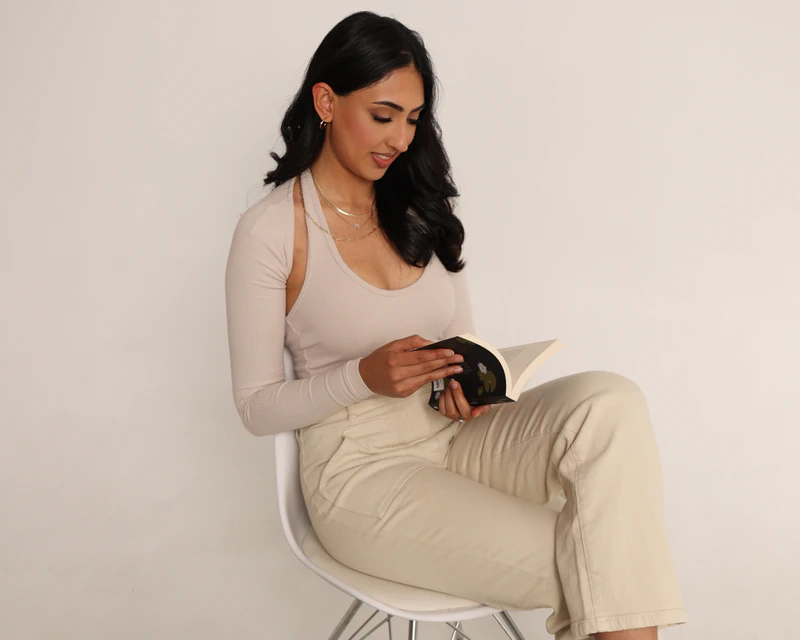As a child in Canada, Natasha’s cultural heritage was her source of pride and identity. Yet, the journey from her homeland to Australia brought both opportunities and obstacles. Through her initiative, Flexibrain, she continues to champion diversity, creativity, and the transformative power of education.
In a freewheeling chat she talks about her journey so far and more.
What was it like growing up in Canada? What are your core memories of living here?
Vibrant. As a child, I remember being unapologetically a flag-bearer for my culture. I loved everything about being Punjabi. Before I had even begun school, I remember making daily trips to the Gurudwara with my Nani ji to do seva (service) in the kitchen or paath (prayer). As I emerged into my schooling years, I embraced going to Punjabi school three times a week and gaining the favour and respect of my teachers by always seeking the highest accolades and being the only student who wore her salwar kameez to class. I loved it so much that I began writing poetry in Punjabi. I remember the surging pride I felt when I recited my rhyming poem “Rab da Roop” (‘God’s Beauty’) at an International Mother Language Day event in Surrey, BC. I had to perform it twice because the attendees assumed I was reciting someone else’s poetry, not my own, at seven years old. And simultaneously, at school, I truly felt like I was part of a mosaic. My friends came from all different backgrounds – Vietnamese, Gujarati, Filipino, Pakistani, Chinese, you name it. The school community was colourful and a concord of cultures. Different languages buzzing and humming at school drop-offs in the morning. The rich smells of different ethnic dishes swirling the air on our school “Culture Night Potluck”. Reflecting on it all now, I know how privileged I was to have felt such a deep sense of belonging wherever I was.
Being from a different race and community, did you ever face any racism or discrimination?
As a child, I was steeped in my cultural pride, innocence, and unknowingness. I felt wholly accepted until the first nine years of my life. And then a change of circumstances and neighbourhood shook everything I up. I became deeply aware of my otherness. I swapped my oiled plaits and Punjabi suits for shame and a tennis skirt. I became overly conscious about my ‘exoticness’ and how tanned my arms were in a sea of pale and waxed country club limbs. The micro-aggressions and subtleties of racism became more apparent as I matured. “Oh, you’re so _____ for an Indian girl!”. Whether the loaded flattery was about beauty or smarts or how articulate I was, I knew it was a racially-motivated insult disguised as a compliment. Why couldn’t we be beautiful or intelligent or well-spoken without being subverted as the inferior? And as I furthered my education into university studies, I became more aware of the discrimination faced by people in my community and other minorities, in more systemic and institutionalized ways.
 Natasha reciting her poetry as a student
Natasha reciting her poetry as a studentMoving to Australia must have been a significant step considering the weather, time difference, and opportunities. Can you describe the change and adjustment process?
Moving to Australia was an act of love. I followed my heart to be with my now husband. But that also came at a heavy cost. My bond with my family, namely my mum and sister, is one of utmost importance to me. Living far away from them is the greatest compromise of all. It doesn’t get easier. I have just come to understand the power and strength of enduring love and support that lives in spirit and heart. I am closer to my mum and sister than I have ever been, thanks to daily Facetimes at odd hours of the day. This change has been both an exercise of isolation but also one of empowerment. At times, things feel impossible without the physical presence of family and childhood friends but the challenge has created perspective. I have had to forge and create my own friendships, networks and life here in Melbourne.
On another note, there are many parallels between Australia and Canada – a great deal has to do with our traumatic histories of being settler colonial states that pillaged land and livelihoods of Indigenous people. Australia is younger and more immature when it comes to its commitment to reconciliation and steps towards acceptance of other cultures. Perhaps I am highly critical because I can compare my two homes, but adjusting to this very green and growing sense of multiculturalism and openness in Australia has been hard. Sometimes I feel misunderstood or the need to explain myself. But with this apparent sense of lack, there is alternatively an apparent moment for community-building to bridge the gap. It is an exciting time to be here in Australia. Punjabi is the fastest growing language in this country. Reframing the changes and adaptations in my life as windows of opportunity will not only serve me but also the people around me.
As a poet, can you share insight into your creative process?
To be quite honest with you, I only re-tapped into my creativity about a year ago. I shut off my love for writing about eleven or twelve years ago. As a child and a teenager, I knew I loved to immerse myself in daydreaming, brainstorming and writing from the heart. But somewhere along the way, life took over and I became untethered from my well of curiosity and creativity. I recognised my hunger to write again last year when I was struck by a poem that found its way back to me after nineteen years. I was jolted into action and decided to set myself a 365-day poem challenge. I knew it was an overly-clinical and regimented approach to something that is meant to flow with ease and fluidity but I also knew that if I broadcasted my daily poems to the world (my meagre 2700 followers on Instagram), that I would be held accountable to watering and nurturing my gifts each day. I am about forty-odd days away from completing my challenge but I have learnt a great deal about my ‘creative process’. Number one, imposter syndrome is REAL and even as I type these words, I feel a strong urge to shy away from describing a ‘creative process’. Notice how I put it in inverted commas? But I have also realised that each of us is creative and our creativity manifests in different ways and therefore I should embrace what made the hours pass like minutes when I was a child. To answer your question, I feel most in touch with my intuition when I am connected to nature. There is something about being amongst the noble giants outside, the eucalypts, the gums, the oaks, the elms, that brings me great solitude but also connects me to an awe-inspiring feeling of oneness. It is in those moments when the words pour out of me. Lastly, I am relishing in creating a ritual around writing. I wish for it to become a sacred practice, an offering to the world around me. Once in a while, I like to light a candle, give thanks for the privilege of writing and living freely, and then I ink my thoughts without the inkling to check the time or stop for breaks. The creative process is emerging, unfolding and evolving as I become more centred in myself and in nature.

How did the idea for Flexibrain come about, and what inspired you to found it?
Flexibrain was born out of an itch to be creative beyond the four walls of a classroom. I had always wanted to be a teacher since I was a young girl. It only makes sense: I come from a family of teachers and education has always been of utmost importance to us. But when I stepped into the classroom as a registered teacher, I felt held back and discouraged by the constraints of school policies, a lack of support for students with additional needs, the overwhelming responsibilities that are expected of us on top of actual teaching, the list went on. I knew that I had a way of connecting with children that could really unlock their potential to not only grow in their learning but more importantly, to develop a love for learning. I had never ever envisioned myself running my own business but I owe that leap of faith to my partner and his family. For a long time, I had boxed myself into the category of ‘teacher’, thinking that this would be the career I would pursue for the rest of my life. But once I encountered my partner’s family, I got to see the tenacity and grit of true entrepreneurial spirit. That you could be many things at once. My father-in-law, a skilful career veterinarian surgeon, only a few years ago, decided to take up commercial blueberry farming. He had come to Australia in the 1980s with nothing from Punjab and built a legacy for himself. Here I was, born in Canada, with a handful of degrees and privilege… What was stopping me from turning my passion for education into a business?
With your extensive experience in education, how do you perceive the role of education in empowering young minds and migrants?
Education is one of the greatest keys, if not the greatest key, to unlocking doors for young minds and migrants. Literacy skills are the foundation of communication and communication is the bedrock of our society. People who have access to education, especially the opportunity to pursue tertiary education, are empowering and equipping themselves to pursue their dreams, advocate for themselves and also to be agents of change. I think we also forget how much education teaches us about cultural exchanges. It is the most enriching experience for a young person to be exposed to diverse experiences and perspectives so they can build a sense of tolerance and compassion. I say all of this but I also have to caveat my rosy ideas of education with a big asterisk. Not everyone has the same access to education and privilege is a key player here. No two experiences of education are the same and we must endeavour to create a sense of equity (not equality) so that all people, especially those who are vulnerable, have the opportunity to flourish.
From your experience, what do you believe is the most effective tool or approach in sparking students’ love of learning?
Connection. I cannot stress enough how much it matters to students to trust their educators so that they feel safe to learn, thrive and take risks. Flexibrain is completely remote now but regardless of our programs being online, I still know all of my students well enough to take an interest in their lives and connect the material to something that resonates with them. Children need to know that they have an adult in their life, hopefully one of their educators, that is an advocate for them. The special sauce comes down to making young people feel seen, heard and validated. Once this sense of safety is created, that is when the true magic happens. Students become excited to engage, eager to interact with and learn from their peers, become open to feedback and be actively striving for growth and progress.

How do you integrate your personal experiences into your venture, Flexibrain?
Our experiences, as much as they are personal, they are also universal. I see so much of myself in the students I have the privilege to teach. When I was younger, I recall having an appetite to be a well-rounded student. I had always wished for mentors, role models, individuals to look up to who could guide me and help me navigate the challenges of childhood and adolescence. All the things I did in school, were on my own accord (except for one very uninspiring Physics tutor!). I endeavour to impart on students what I had wished for myself at that age, including the language and tools to persevere (growth mindset being one of them). Being raised by a strong, single mother myself, I also deeply resonate with children from diverse family backgrounds which helps to foster greater compassion, understanding and commitment to catering to unique client needs. I can only attempt to and hope that my value for authenticity, integrity and creativity translate to Flexibrain’s content and practices.
What are your aspirations and plans for Flexibrain’s future?
Wow, this is a big question! I see Flexibrain being a universal literacy platform that teaches core skills so that young people can thrive in their educational and professional endeavours. I envision it be a service that can be accessed by all because of its multifaceted offerings: live classes, self-guided courses, mentorship, resources, content, consulting, you name it. There will be an entry point for all. I see our content reaching globally and inspiring families and young people to adopt a love for learning, a growth mindset and the core skills to develop literacy. I also see Flexibrain as a stepping stone for other community-building initiatives. As a proud Punjabi woman, I am hyperaware that visibility matters and I want to collaborate with other diverse, female founders to uplift our local and global communities.






